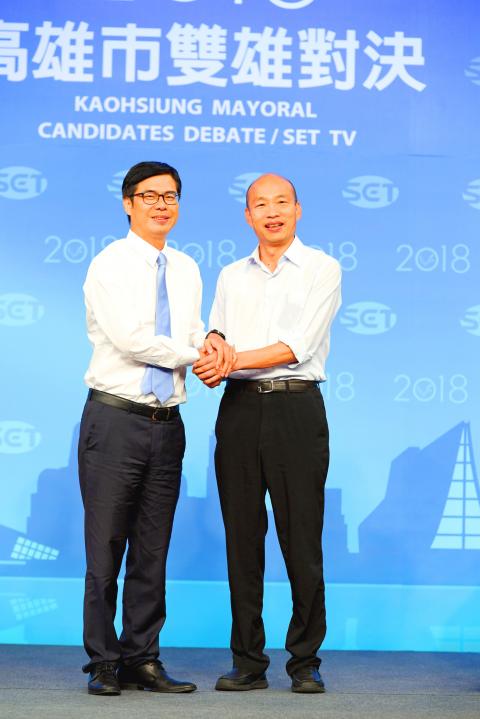The Democratic Progressive Party (DPP) and Chinese Nationalist Party (KMT) Kaohsiung mayoral candidates last night traded barbs on everything from the economy, investment and tourism, to population and administrative competency in their only televised debate of the campaign.
The two-hour debate, broadcast by Sanlih E-Television, began at 8pm with the DPP’s Chen Chi-mai (陳其邁) and the KMT’s Han Kuo-yu (韓國瑜) delivering their opening statements. There were two rounds of questioning before the debate ended with final statements from each candidate.
Kaohsiung, which has been run by DPP members for 20 years, has become the site of one of the hottest mayoral races in the nation.

Photo: Chang Chia-ming, Taipei Times
People should not abuse or trample Kaohsiung for the sake of an election, Chen said, adding that it did not have to be him who gets elected, as long as it was not Han.
“Elections are temporary, but Kaohsiung is forever,” Chen said.
“How [were KMT Chairman and former Kaohsiung mayor Wu Den-yih’s (吳敦義) remarks last week] different from Han calling Kaohsiung ‘old and poor,’” he said.
Wu on Sunday apologized for referring to Presidential Office Secretary-General Chen Chu (陳菊), who was mayor of the city for almost 12 years, as “a fat sow.”
“This is the way the KMT has consistently treated Kaohsiung,” Chen said.
He promised to create a point of contact to attract businesses and investments, open a science park in Ciaotou District (橋頭), connect Kaohsiung and Tainan via a “technological corridor,” and bring in more than NT$600 billion (US$19.4 billion) in economic output.
“Kaohsiung needs to move forward, but not by drilling for oil near Itu Aba (Taiping Island, 太平島) or building a Ferris wheel motel near Love River (愛河),” Chen said, adding: “If [Han] were willing to take back these unrealistic policies, [he] would earn my respect.”
Han said that his remarks about Kaohsiung being “old and poor” had been proven by Chen’s earlier admission that “the city is confronting issues of an economy in transition, a graying population and fiscal imbalances.”
“Shutting people down for saying things that are true is the reason those problems are not solved,” Han said.
Kaohsiung’s municipal debt of NT$250 billion to NT$300 billion is the highest in the nation, while it also ranks lowest for population growth, employment opportunities and youth unemployment, while its share of people with middling to low income and violent crime is outsized, he said.
“Those are the realities of Kaohsiung that we should confront bravely,” Han said.

The US government has signed defense cooperation agreements with Japan and the Philippines to boost the deterrence capabilities of countries in the first island chain, a report by the National Security Bureau (NSB) showed. The main countries on the first island chain include the two nations and Taiwan. The bureau is to present the report at a meeting of the legislature’s Foreign Affairs and National Defense Committee tomorrow. The US military has deployed Typhon missile systems to Japan’s Yamaguchi Prefecture and Zambales province in the Philippines during their joint military exercises. It has also installed NMESIS anti-ship systems in Japan’s Okinawa

‘WIN-WIN’: The Philippines, and central and eastern European countries are important potential drone cooperation partners, Minister of Foreign Affairs Lin Chia-lung said Minister of Foreign Affairs Lin Chia-lung (林佳龍) in an interview published yesterday confirmed that there are joint ventures between Taiwan and Poland in the drone industry. Lin made the remark in an exclusive interview with the Chinese-language Liberty Times (the Taipei Times’ sister paper). The government-backed Taiwan Excellence Drone International Business Opportunities Alliance and the Polish Chamber of Unmanned Systems on Wednesday last week signed a memorandum of understanding in Poland to develop a “non-China” supply chain for drones and work together on key technologies. Asked if Taiwan prioritized Poland among central and eastern European countries in drone collaboration, Lin

BACK TO WORK? Prosecutors said they are considering filing an appeal, while the Hsinchu City Government said it has applied for Ann Kao’s reinstatement as mayor The High Court yesterday found suspended Hsinchu mayor Ann Kao (高虹安) not guilty of embezzling assistant fees, reducing her sentence to six months in prison commutable to a fine from seven years and four months. The verdict acquitted Kao of the corruption charge, but found her guilty of causing a public official to commit document forgery. The High Prosecutors’ Office said it is reviewing the ruling and considering whether to file an appeal. The Taipei District Court in July last year sentenced Kao to seven years and four months in prison, along with a four-year deprivation of civil rights, for contravening the Anti-Corruption

NO CONFIDENCE MOTION? The premier said that being toppled by the legislature for defending the Constitution would be a democratic badge of honor for him Premier Cho Jung-tai (卓榮泰) yesterday announced that the Cabinet would not countersign the amendments to the local revenue-sharing law passed by the Legislative Yuan last month. Cho said the decision not to countersign the amendments to the Act Governing the Allocation of Government Revenues and Expenditures (財政收支劃分法) was made in accordance with the Constitution. “The decision aims to safeguard our Constitution,” he said. The Constitution stipulates the president shall, in accordance with law, promulgate laws and issue mandates with the countersignature of the head of the Executive Yuan, or with the countersignatures of both the head of the Executive Yuan and ministers or